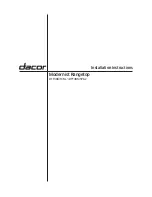
18
Induction cooking
Advantages of induction cooking
Induction cooking represents a radical change from the
traditional method of heating; the heat is generated directly in
the pan. It therefore offers a number of advantages:
■
Time savings for cooking and frying; since the pan is heated
directly.
■
Energy is saved.
■
Care and cleaning are simpler. Foods that have spilt do not
burn as quickly.
■
Heat and safety control; the hob supplies or cuts off power
immediately when the control knob is turned on. The
induction hotplate stops supplying heat if the pan is removed
without having previously switched it off.
Suitable pans
Ferromagnetic pans
Only ferromagnetic pans are suitable for induction cooking,
these may be made from:
■
enamelled steel
■
cast iron
■
special cutlery for stainless steel induction pan
To determine whether a pan is suitable, check to see if a
magnet will stick to it.
Other suitable cookware for induction
There are other types of cookware especially made for
induction whose base is not entirely ferromagnetic.
Unsuitable pans
Never use pans made from:
■
common thin steel
■
glass
■
earthenware
■
copper
■
aluminium
Characteristics of the pan base
The characteristics of the pan base may affect the uniformity of
the cooking results. Pans made from materials which help
diffuse heat, such as stainless steel sandwich pans, distribute
heat uniformly, saving time and energy.
Absence of pan or unsuitable size
If no pan is placed on the selected hotplate, or if it is made of
unsuitable material or is not the correct size, the power level
displayed on the hotplate indicator will flash. Place a suitable
pan on the hotplate to stop the flashing. If this takes more than
90 seconds, the hotplate will switch off automatically.
Empty pans or those with a thin base
Do not heat empty pans, nor use pans with a thin base. The
hob is equipped with an internal safety system. However, an
empty pan may heat up so quickly that the "automatic switch
off" function may not have time to react and the pan may reach
very high temperatures. The base of the pan could melt and
damage the glass on the hob. In this case, do not touch the
pan and switch the hotplate off. If it fails to work after it has
cooled down, please contact the Technical Assistance Service.
Pan detection
Each hotplate has a minimum limit for detecting pans, which
varies depending on the material of the pan being used. You
should therefore use the hotplate that is most suitable for the
diameter of your pan.
When using large cookware on a
smaller ferromagnetic zone, only
the ferromagnetic zone heats up,
so heat might not be uniformly
distributed.
Cookware with aluminium on the
base reduce the ferromagnetic
zone, so less heat may be sup-
plied or be difficult to detect.
For good cooking results, the
diameter of the cookware's ferro-
magnetic area should match the
size of the hotplate. If cookware
is not detected on a hotplate, try
it on the next smaller hotplate
down.
Summary of Contents for N4 D30 Series
Page 1: ...es Instrucciones de uso 2 en Instruction manual 15 el 27 N4 D30 Placa de cocci n Hob...
Page 28: ...28 100 2 cm...
Page 29: ...29 RAEE 2002 96 CE...
Page 30: ...30 sandwich 90...
Page 31: ...31 2 A 3 Powerboost x W Powerboost...
Page 34: ...34 3 10 3 1 2 5 1 2 5 Powerboost Powerboost 1 2 1 powerboost 1 2 1 2 Powerboost...
Page 35: ...35 1 3 x 2 30 10 10 x 3 3 99 3 x 99 1 3 S 2 10 05 3 S 3 10 3 S 35...
Page 36: ...36 1 10 10 30 1 Power Management 1000 W 1500 W 2000 W...
Page 37: ...37 1 2 10 3 3 3 4 5 3 4 1 2...
Page 38: ...38 30 30...
Page 39: ...39 E FD E FD GR 2104 277 701...
















































